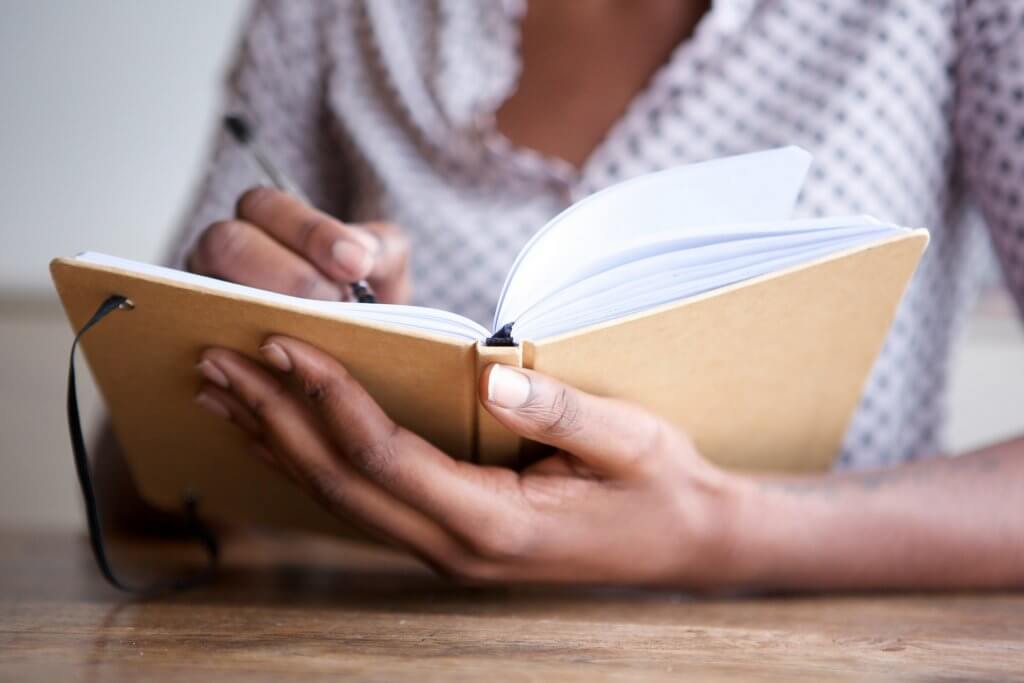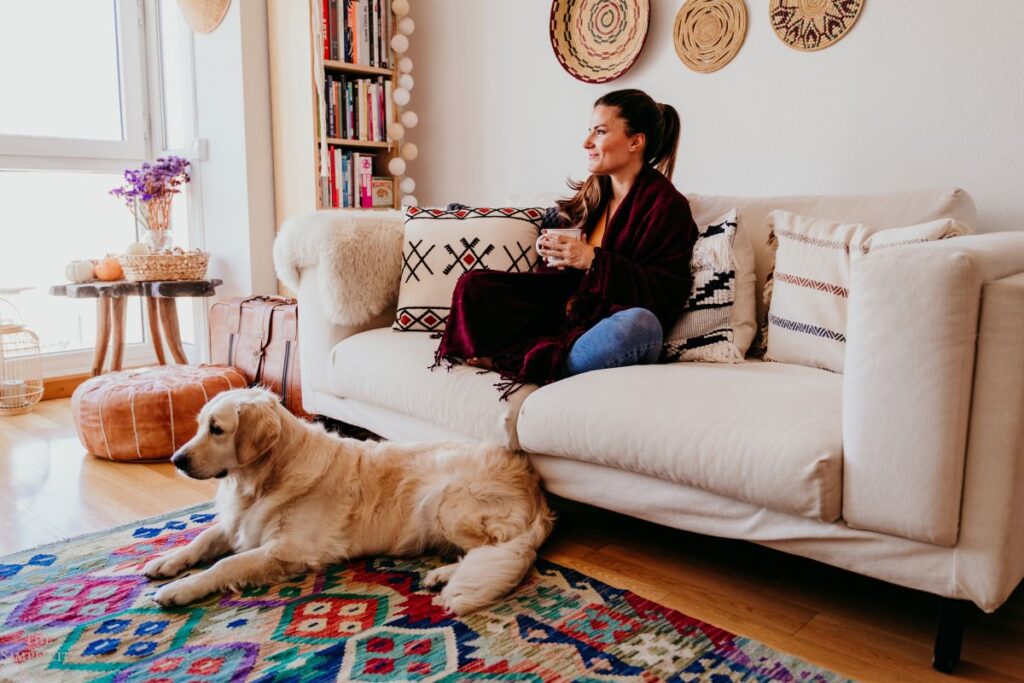Inside: If you’re feeling stressed, implement some of these calm habits to help you have a more balanced life.
Habits are powerful tools that can transform our lives in meaningful ways.
Some habits, like brushing your teeth every morning or taking a daily multivitamin, help you stay healthy.
Other habits, like tidying up your house after dinner or planning your meals each weekend, help you stay organized.
Habits can help you improve virtually any facet of your life that you can think of.
And if you’ve been feeling stressed or overwhelmed?
You can easily incorporate some calm habits into your routine to combat those feelings and feel more balanced.

What are some calm habits I can incorporate into my routine for a more balanced life?
Not sure what calm habits might help you? Good news – there are quite a few to choose from.
Here are just a few of my favorite calming habits that you can easily make room for in your day:
1. Meditation and prayer.
If you’re looking for a habit to help you find a sense of balance and calm your mind, it doesn’t get much better than meditation and prayer. The art of being present and quieting your thoughts might be intimidating to those who have never tried it, but with a little practice, you can easily make it a habit.
The best thing about meditation and prayer is it’s something you can do anytime, anywhere – in your living room as you start your day, at the office before a big meeting, while you’re riding public transit. Being able to find your breath, slow your heart rate, and reconnect is a powerful skill.
And like any skill, meditation and prayer are something you learn how to do. Fortunately, there are lots of ways you can do it. For meditation apps like Calm or Headspace, make it easy to practice wherever you are. For prayer apps like Pray or Hallow are great places to start.
Mediation and prayer are good habits to have in your life and they can help you to feel more calm and balanced emotionally and spiritually.

2. Saying “no.”
Like meditation, learning to say “no” is a skill that many of us can benefit from learning. And by making it a habit, we can make great strides in preserving our inner peace and finding more balance in our lives.
If you’re a people-pleaser, saying “no” can feel completely foreign. You accept all plans and invitations. You can’t turn down a friend who needs help or someone who asks for a favor.
At work, you’re inclined to put in extra hours, pick up extra projects, and do the things that other people don’t want to do.
All of that adds up and chips away at your time. Sure, we may want to accept some plans but it’s important to prioritize so you don’t end up feeling burned out and resentful.
By making “no” a habit, you’ll be surprised to see just how much calmer your days, weeks, and months can feel.
At the bare minimum, taking time to weigh your options before you decide on whether or not to commit is a habit that will prevent overwhelm in your life.
When you’re overcommitted it brings more stress to your life. It can also keep you from spending time on the things that matter most.

3. Monotasking instead of multitasking.
For years, people have praised the act of multitasking. People who could effectively split their energy between multiple things at once were considered productive and efficient.
But new research has shown this to be incorrect. Forcing your brain to constantly switch between tasks is actually less efficient. Not only that, but juggling so many things at once can get overwhelming fast.
By devoting your attention to one task at a time and monotasking, not multitasking, you can keep overwhelm at bay and support a more calm, balanced mindset.
Consider your use of technology and implement boundaries as needed. Phones are often a cause of distraction and can make you feel more stressed.
Immersing yourself fully in one task at a time is a productive habit that will help you find your flow and produce a better-finished product in a less stressful way.
And by giving the same level of attention to everything else in your life, whether you’re practicing a hobby or cooking a meal, you’ll find you can create a sense of calmness – not chaos – in all that you do.
If you’re a mom of little kids, this may seem like an impossible ask, but trying to focus on one thing at a time when you can is a great goal.

4. Journaling.
Journaling is another wonderful habit that can help you live a balanced life. It doesn’t get much more calming than sitting down with your favorite pen and a blank page and simply writing down your thoughts while sipping on your favorite warm beverage.
There are many helpful benefits to journaling. It’s a great way to process a variety of feelings and thoughts.
When you’re feeling anxious, stressed out, or overwhelmed, journaling can be an excellent tool to help you work through those emotions and solve your problems. Writing down your thoughts and feelings can bring a surprising sense of clarity and encourage a deeper understanding of yourself.
The best part? There’s no wrong way to do it. You can take a stream-of-consciousness approach and write down whatever comes to mind, with no plan or intention.
You can make a list – a list of things you love, a list of things that are bothering you, a list of things you’re struggling to figure out.
Need even more structure? You can find journaling prompts for anxiety, gratitude, or virtually any topic you want to journal on. They’re a great way to inspire and guide your journaling practice.

5. Spending time in nature.
There’s something about reconnecting with nature that just feels good.
And it isn’t just a feeling.
Spending time outdoors actually has many proven, well-studied benefits. It can ease anxiety and depression, help you focus, increase your overall satisfaction levels, improve your sleep, and so much more.
The best part? It doesn’t cost a thing to get outdoors and soak up the sunshine.
For a calm habit to help you find more balance, try to spend some time outside each day.
That might mean doing yoga in your backyard, taking a walk around the block, riding your bike, or going for a jog through a nearby park.
But it doesn’t have to be a physical activity – you can simply enjoy your coffee or an evening glass of wine on your patio, eat lunch outside, recharge with a quick rest in a well-placed hammock, or read a book outdoors.
Fresh air is good for the body and the soul. Spending more time in nature is a great habit that will help you to feel more calm.

6. Make your home your sanctuary.
Your home should feel like your sanctuary. It should be a relaxing and calming space where you can rest and recoup after the end of a long day.
The problem is for many it is not a calm space. Rather, it feels chaotic and serves as a constant reminder of things that need to be done.
If your space is making you feel frustrated and stressed, start with these things to declutter for more calm.
Removing the excess from your home will help make it easier to organize, keep clean, and manage. The process can feel overwhelming at times, but if you start decluttering by focusing on small defined areas, it feels more doable.
After decluttering unneeded items from your home, you can maintain your space by instilling small tidy habits.
These small changes can make a big difference in how your home looks, feels, and functions. By creating a space that works for you, you can feel more calm and peaceful.

7. A peaceful morning & evening ritual.
By starting your day off with a calming ritual, you can set the tone for your entire day and keep feelings of overwhelm at bay.
Your peaceful morning ritual might include some of the habits I’ve already suggested here – journaling, meditating, or getting outside. But there are so many other options.
Your peaceful morning habits might be your skincare routine, or putting on your favorite chill playlist to start your day. It might be a gentle stretching routine before you even get out of bed. It might be taking a moment to reflect on the things you’re grateful for, or reading a few pages from an inspirational book.
Whatever you do, find a way to ease into your day – instead of snoozing your alarm until the last minute and scrambling to get ready. By taking it slow and incorporating a peaceful morning ritual into your routine, you can embrace a sense of calm and balance that you can carry with you throughout your day.
Also, consider your evening routine and how you wind down and prepare for the following day as well as making sure you get adequate rest. Some of the same things listed for your morning routine could be part of your evening routine. It just depends on what works for you.
You may need to test out some different things to figure out your ideal morning and evening rituals, but they can make a big difference in how calm and peaceful you feel.
Which of the calm habits would help you to have a more balanced life? Leave a comment and let me know!
Sign up on the form below to get weekly decluttering tips and inspiration sent straight to your inbox. You’ll also get the free 5 Areas to Declutter in 10 Minutes Checklist to help you get started decluttering today.


Evening ritual is most challenging
great article. reagarding #3, no multi-tasking, in project management, I teach the more complex the task the longer it takes your brain to get reengaged. For a complex IT task, the average is 20 min. Doing that just 3 times/day, is a waste of 1 hour or 12.5% of an 8-hour day.
Make your home a sanctuary:-)
Cheers Spike
I am grateful that you took the time to write this article. I’ve been trying to figure out how I can calm down and relax lately especially since my blood pressure have been rising and I know it’s related to my mismanagement of stress. Seeing your article today was a blessing. I will try to incorporate some of your suggestions. Again I want to say thank you
I just wanted to say I agree 100% with all of them. I am trying to incorporate each one.
Great suggestions to begin implementing in the new year!
Most important for me is No. 2 (just say ‘no’) and No. 3 (no multi-tasking). Found I over-schedule myself for outside activities so I am honing in on home tasks and completing them.
As a person with ADHD, I realized I was multi-tasking and even trying to carry three different items at one time. Getting better prioritizing in segments, such as sending out-of-state Christmas cards first. When I feel myself starting to divert my attention to a 2nd or 3rd task, I actually tell myself “Focus” to stay on track. At the end of the day I review my productivity. Starting to see some progress and less stress.